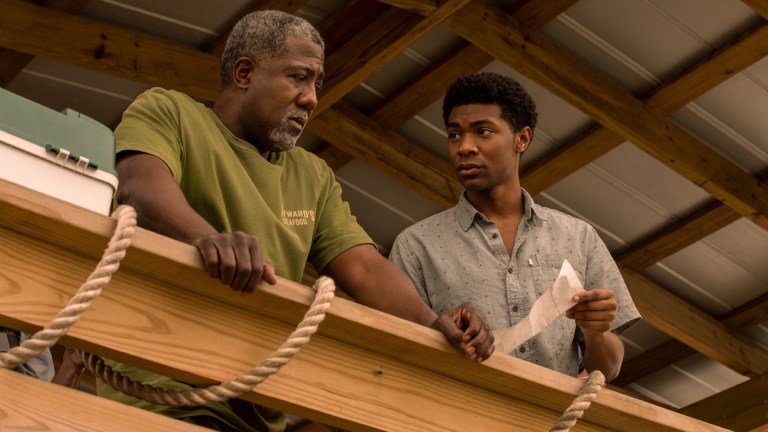Outer Banks Season 2: Why Pope Is The Rightful Heir of the Royal Merchant Treasure
Outer Banks season 2 unveils the full story of Pope Heyward's family, and in the process fills in some fascinating historical blanks.

This article contains spoilers for Outer Banks season 2.
Outer Banks season 1 centers around John B Routledge, his search for answers about his father’s disappearance, and its connection to a sunken treasure. John B, along with his best friends, JJ, Kiara, Pope, and new-beau Sarah uncover the whereabouts of the missing Royal Merchant gold and discover the truth about Big John. Season 2 expands on the Royal Merchant mystery, giving the Pogues something new to search for, and imbuing it with additional meaning for one member of the group in particular, Pope.
Pope Heyward is a Pogue, one of John B’s best friends, and an integral part of solving the mystery of the Royal Merchant. Among the group, he’s the most responsible and studious. And if there is sense to be had, he’s the one most likely to have it. In season one, Pope is so invested in the search for the Royal Merchant that he walks out of an interview for a merit scholarship, all but assuring his rejection. His interest was mostly curiosity, and wanting to help his friends. But it turns out that the adventure has big implications for Pope and his family.
Outer Banks has a rich in-universe history that, while fictional, does have real-world influences and inspirations. One such inspiration is Denmark Tanny, who is loosely inspired by Denmark Vesey. Vesey was a carpenter and formerly-enslaved person who won a $1500 lottery and bought his freedom for $600 in 1799. He was however unable to buy freedom for his wife and children, which some people believe motivated his anti-slavery work. In 1822, Vesey and leaders at the African Methodist Episcopal Church began planning a rebellion for July 14th. By June 22, Vesey was caught, after enslaved persons leaked rebellion plans to their captors. By August 9th, 35 people, including Vasey, were hanged for their part in the rebellion.
In the show, Denmark Tanny was enslaved on the Royal Merchant, until it went down. The ship was carrying hundreds of millions worth of Spanish gold, and Denmark was the sole survivor of the shipwreck. Denmark used the gold to buy his freedom, the freedom of others, and the Tannyhill plantation that covered most of the island at the time. He hid the rest, and left clues to its whereabouts in correspondence to his son.
Season 1 told us one part of Denmark Tanny’s story, and the Pogues followed this local history and Denmark’s own writings to the gold. Season 2 further expands on this history, and brings it closer to home. Carla tells Pope of how Denmark wanted to buy freedom for his wife Cecilia and their daughter, but their enslavers, Carla’s own ancestors, refused. Cecilia was caught while trying to escape, but her daughter wasn’t. Denmark was ultimately hanged for digging up his wife’s body, and his last words were interpreted as new clues to yet another treasure “at the foot of the angel.”
Pope learns he is a descendent of Denmark Tanny, and an heir to the Tanny legacy. Pope’s great-grandmother tells him she kept that from the family so none of them would get caught up in seeking revenge, which may have protected them from further harm, but also kept them from any rightful inheritances of Denmark’s estate. Pope not only has to consider the unrequited injustice of Denmark’s life, but how it directly influences his present circumstances. Outer Banks makes frequent juxtapositions between the lives of the Pogues and the lives of the Kooks, and Pope discovering his family legacy removes all subtext, and calls these inequities what they are.
At season’s end, Pope, having heard the story of Cecilia’s death, and having read Denmark’s journals, immediately realizes that the treasure at the foot of the angel is Cecilia’s body. That Carla Limbrey of all people would be the one to disturb Cecilia’s final resting place after her ancestors killed Denmark for burying his wife, that they also killed, is … fitting. The Pogues are careful to return the coffin to where it was found. They also find a clue that leads them to the actual location of the cross, which was built into the rafters of Denmark’s church for Freedmen.
Pope’s discovery recontextualizes his relationship to the Royal Merchant treasure and his connection to the town that Denmark Tanny built with it. Pope’s interest in the treasure is about much more than wanting to get rich, it is about wanting justice for his ancestors, and reclaiming what is rightfully theirs. The treasure has always been framed within the show as belonging to Denmark so it’s reasonable to expect his descendants to have legitimate claim to it. Ward stole the Royal Merchant gold. And after shenanigans, ended up with the cross as well.
John B’s search for answers about his father’s disappearance drives the first season. And more than the promise of wealth, it’s the desire to finish what his father started that makes the treasure hunt personal for him. The rest of the Pogues are driven by their loyalty to one another, and their desire to escape their circumstances. In season two, Pope has as much of a reason, if not moreso, to go after Ward Cameron and reclaim the Royal Merchant treasure.
Outer Banks haves and have-nots/Pogues versus Kooks dichotomy is richer because it also touches on real history and the kind of legacies that America is built on.

